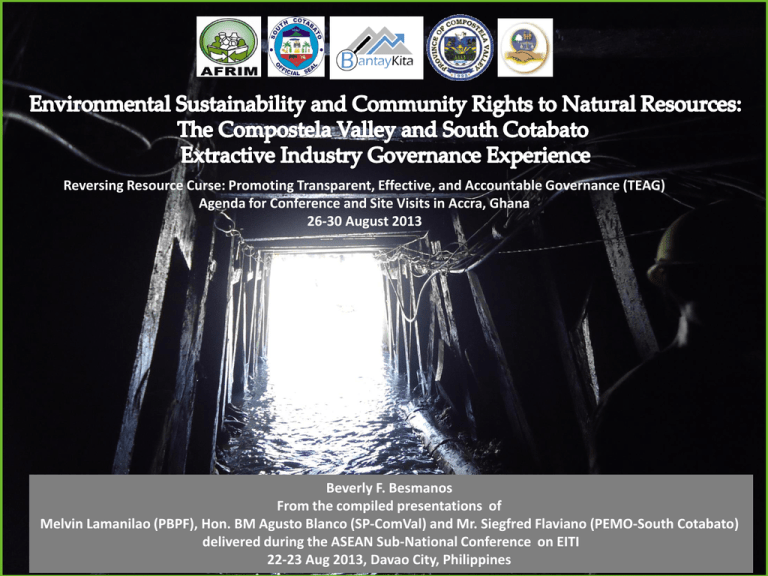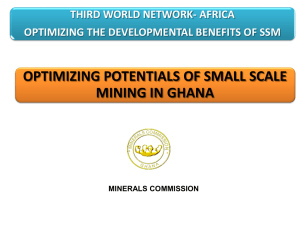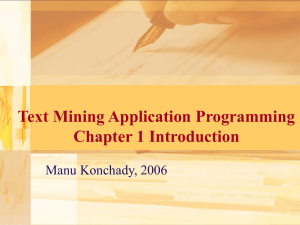Presentation
advertisement

Reversing Resource Curse: Promoting Transparent, Effective, and Accountable Governance (TEAG) Agenda for Conference and Site Visits in Accra, Ghana 26-30 August 2013 Beverly F. Besmanos From the compiled presentations of Melvin Lamanilao (PBPF), Hon. BM Agusto Blanco (SP-ComVal) and Mr. Siegfred Flaviano (PEMO-South Cotabato) delivered during the ASEAN Sub-National Conference on EITI 22-23 Aug 2013, Davao City, Philippines A BACKGROUND STUDY ON THE SMALL-SCALE GOLD MINING OPERATIONS AND THEIR IMPACT ON THE ECONOMY, THE ENVIRONMENT AND THE COMMUNITY A Study Commissioned by Bantay Kita 2011-2012 Small-Scale Gold Mining in the Philippines o 1988 - Philippines ranked 2nd to Africa in gold production per unit land area. o 2002 – Philippines ranked 29th as top gold producer. o 2007 – 18th in the GFMS Gold Survey list of Top 20 Gold Producing Countries The 2008 – 2009 data revealed that small- scale mining sector contributed almost 80% of the total gold production. Data Sources: Israel and Asirot, 2002 Teves, 2008 Philippine Mining Almanac 2010 Findings: Economic. SSM operations in the area can contribute to the local revenue generation provided that local policies are in place and enforced. Environment. The current practices of SSM operations threaten the environment. Because of weak enforcement of laws, majority of the SSM operations are illegal and the weak environmental monitoring by the government tolerate substandard facilities. Health and Safety. Dependence on hazardous chemicals in gold extraction and refining processes exposes miners, plant workers and the community to health problems. Women. The SSM operations in the areas provided the women with livelihood from washing ores/sacks and participating in the initial processing of gold. Cultural Dimension. In Benguet, SSM operation is historically part of their way of life. SSM defines their cultural identity. The traditional practices of SSM are threatened by competition for resource and profit. Governance and Policies. The government and the community suffer from weak enforcement of laws. Data Sources: Israel and Asirot, 2002 Teves, 2008 Philippine Mining Almanac 2010 Small-Scale Gold Mining ISSUES: There are inconsistencies in the system of regulation and enforcement of laws; Existing regulatory policies, along with the requirements to seek consent to mine in areas covered by large –scale patented claims raised negative reactions from traditional SSM operated by IP communities; The existing policies on regulation and enforcement threaten the traditional way of small-scale mining and managing of resources in the IP community; The regulation efforts of the government are perceived to be anti-SSM operations and pro-large scale mining operations; The current regulation efforts encourage IP communities to assert their rights over land and resources. Data Sources: Israel and Asirot, 2002 Teves, 2008 Philippine Mining Almanac 2010 Small-Scale Gold Mining CHALLENGES: There is a need to re-visit and amend small-scale mining law (i.e. legal definition of small-scale mining) There are existing conflicts among IP groups in SSM areas, especially when the area has an existing large-scale mining application / operation. There is a huge challenge in the enforcement of laws and much more on the capacity of the local governments to enforce law. Local community shall be capacitated on local development planning. There shall be an alternative livelihood for SSM communities. The shift from agriculture to small-scale mining of communities is a threat for the community (environment, health, food security and socio-cultural issues). Data Sources: Israel and Asirot, 2002 Teves, 2008 Philippine Mining Almanac 2010 “MINAHANG BAYANIHAN PROGRAM” “The South Cotabato SSM Initiatives” The quest for sustainability: ENVIRONMENT SUSTAINABLE MINING ECONOMY SOCIAL GOOD GOVERNANCE The Minahang Bayanihan Program aims to promote sustainable SSM by RESPONDING to current SSM issues and concerns, integrating the concept of CONVERGENCE and GOOD GOVERNANCE GOVERNANCE •S hared Governance •Personnel Investment •I ntegrating Technology •Execute Policies •S ystem Overhaul RESPONSIVE: apacitate to Motivate nvolve to Resolve ct the ACTS E.O. 37, Series of 2013 entitled“ AN ORDER INTENSIFYING SMALL-SCALE MINING PERMITTING AND SAFETY REGULATION in the province of South Cotabato” •Notarized Oath of undertaking Small Scale Mine Safety Rules and Regulations •Area Status Clearance certifying the applied site is not within highly critical disaster prone area •Tribal Resolution/Certification interposing no objection •Section 3. SSM ID System “No individual shall engage in any form of SSM activities without a Registered SSM I.D. which is valid for two (2) years.” CONVERGENCE (BAYANIHAN) ederate System roaden/expand Partnership nter-agency cooperation Positive Results and Impacts -Increased revenue -Increased budget for SSM development Program -Increased participation and involvement -Increased/Facilitated Compliance -Developed Social and Environmental Awareness -Capacitated and well informed miners -Strengthened transparency and accountability mechanisms in SSM operations in T’boli. Towards improved Governance of the Extractive Industry for Sustainable Future • Multi-Stakeholders’ Council on T & A organized last November 2012 • Institute policies, programs and mechanisms ensuring transparency and accountability in the mining industry both large and small scale mining projects in the province • Formulate, design and approve the Guidebook, tools and instruments for transparency and accountability in the mining industry; • Design and implement reporting template for disclosure of information • Conduct periodic review and monitoring of compliance by respective stakeholders to the policies, programs and mechanisms for transparency and accountability • Prepare annual budget for inclusion in the annual appropriations of the Province. Indigenous Peoples’ Response to Transparency Mechanism in Compostela Valley BRIEF PROFILE 11 Municipalities 2 Congressional Districts Home of the six tribes: Mansaka Mandaya Dibabawon Mangguangan Manobo Kagan Ancestral Domain Map of Compostela Valley Province Estimated IP Population: 221, 068 ISSUED AND APPROVED CADTs Land area (Comval): 428,120 has Total: 345,701.91has. 60,968.49 141,769.000 90,413.8676 30,468.23 20,087.33 Mandaya Manobo Mangguangan & Dibabawon Mandaya & Mansaka Dibabawon Mansaka Dibabawon & Mangguangan Ancestral Domains are now taking center stage for Investments Sectoral Distribution of FBI-FPIC Applications since February 2004-Present (%) 2.19 2.92 5.84 6.57 79.56 1.46 .73 .73 Distribution of FBI-FPIC Applications of Miners in ComVal Since February 2004-Present 60.2% 38.9% IP Initiatives on Transparency Mechanism • Review the implementation of FPIC process; • Efforts on Facilitating Compliance to Memorandum of Agreements; and • Review programs and projects implementation by IPOs Taking the principles of Value Chain By experience, FPIC process has its effects to quality of MOA and its state of compliance by Parties Decision to extract/not to extract Fiscal Terms Awarding of Contracts/ licenses Trading of Commodities Extraction Process Revenue Management and allocation Tax and revenue collection Development Project/ policies Lessons Learned on IP Transparency Mechanism Improves the financial management system by making it more transparent; Encourages people to become more responsible in the management of resources; Strengthens indigenous institutions by improving credibility to people running it; Assisting role of stakeholders is helpful to empower ICCs/IPs in exercising self-governance Environmental Sustainability and Community Rights Environmental sustainability in the mining areas can only be achieved if the local government and all stakeholders are well-informed, capacitated and open to transparency and accountability measures in the entire value chain. An inclusive and participatory governance of the extractive industry involves a process of communication and behavioral change (individual, organizational / community level) of the stakeholders in the entire value chain . Community rights can only be ensured when there are enabling policies (local and national – i.e. IPRA Law, Local Environment Code) and continuous community development trainings that will build the capacity and capability of the individuals and community to assert their rights towards management of natural resources. Sound and well-implemented local policies are key to success. Data Sources: Israel and Asirot, 2002 Teves, 2008 Philippine Mining Almanac 2010 Tey bong s’lamat!








